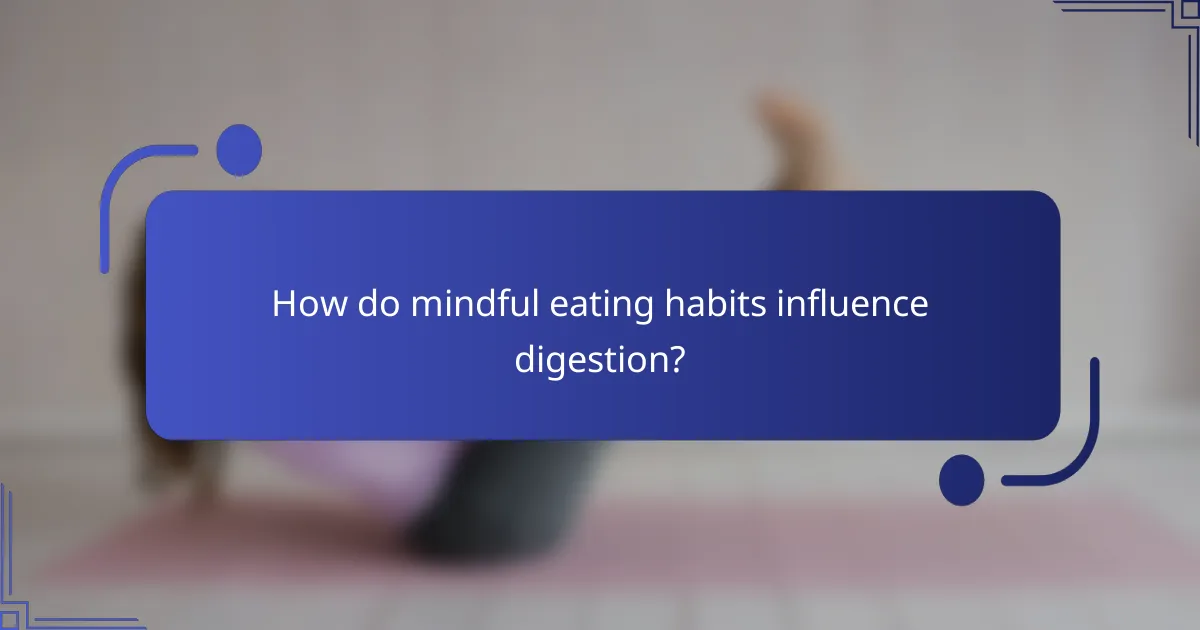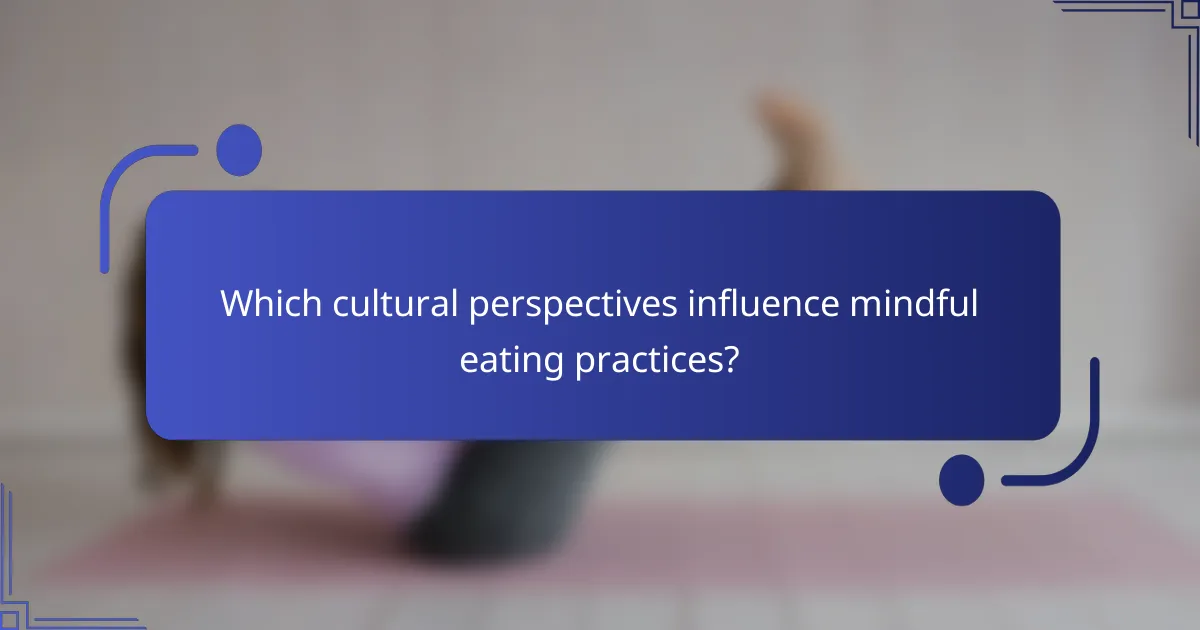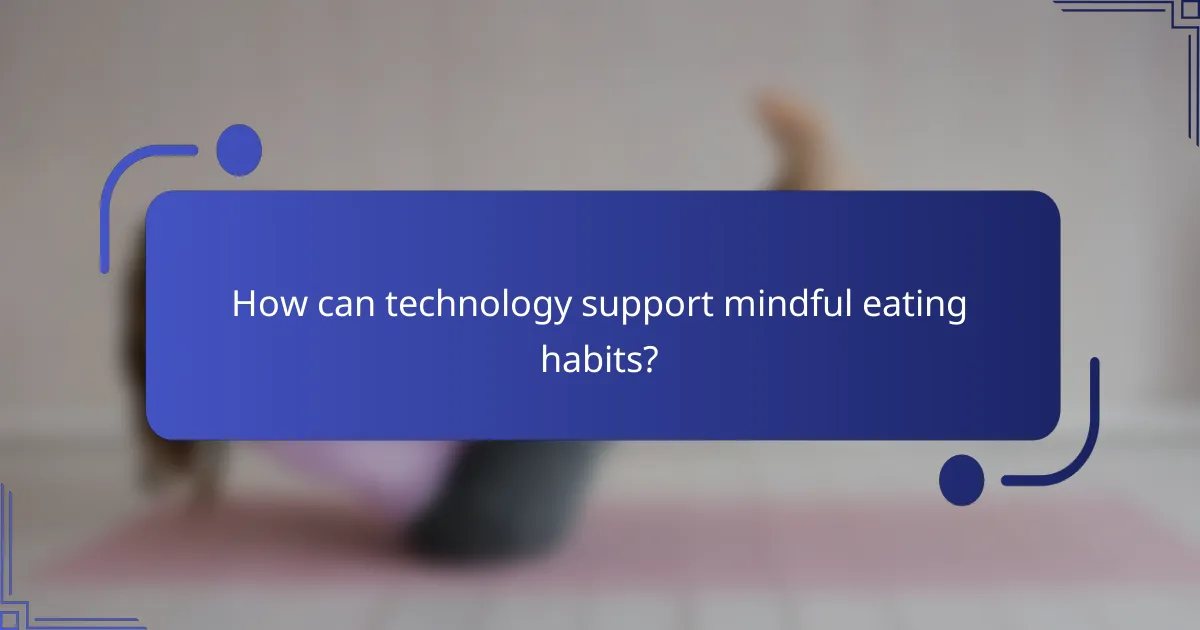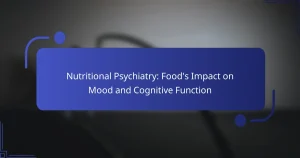Mindful eating habits can significantly improve digestion and emotional wellness. This approach enhances food choices, promotes portion control, and strengthens the mind-body connection. Research shows that mindfulness reduces digestive issues and emotional eating while fostering a positive relationship with food. Incorporating strategies like savoring bites and minimizing distractions can lead to lasting benefits for overall well-being.

How do mindful eating habits influence digestion?
Mindful eating habits significantly enhance digestion by promoting awareness and intentionality during meals. This approach leads to better food choices, improved portion control, and a stronger connection between mind and body.
Research indicates that practicing mindfulness can reduce digestive issues like bloating and discomfort. By focusing on the eating experience, individuals are more likely to chew food thoroughly, aiding in the digestive process.
Additionally, mindful eating fosters emotional wellness, reducing stress and anxiety around food. This emotional stability contributes to a healthier digestive system, as stress can negatively impact digestion.
Incorporating mindful eating strategies, such as savoring each bite and minimizing distractions, can lead to long-term improvements in digestive health and overall well-being.
What are the physiological benefits of mindful eating for digestive health?
Mindful eating enhances digestive health by promoting better food choices, reducing overeating, and improving gut function. This practice encourages individuals to focus on their meals, leading to increased awareness of hunger and satiety signals. As a result, mindful eaters often experience improved digestion, reduced bloating, and enhanced nutrient absorption. Research indicates that mindfulness can also lower stress levels, which positively impacts digestive processes. By fostering a deeper connection with food, mindful eating contributes to overall digestive wellness and emotional balance.
Which mindful eating techniques promote better digestion?
Mindful eating techniques that promote better digestion include eating slowly, paying attention to hunger cues, and minimizing distractions. These habits enhance the digestive process by allowing the body to properly break down food and recognize fullness.
1. Eat Slowly: Chewing food thoroughly aids digestion and helps prevent overeating.
2. Focus on Hunger Cues: Listening to your body’s signals can prevent indigestion caused by overeating.
3. Minimize Distractions: Eating without screens or multitasking enhances awareness of food and portion sizes.
4. Savor Each Bite: Engaging the senses improves the eating experience and promotes mindful consumption.
How does portion control relate to mindful eating and digestion?
Portion control enhances mindful eating by promoting awareness of hunger cues and satiety signals, which aids digestion. Mindful eating encourages slower consumption, allowing the body to process food effectively and reducing overeating. Studies show that individuals practicing portion control report improved emotional wellness as they develop a healthier relationship with food. This approach fosters a deeper connection to eating habits, leading to better digestive health and overall well-being.
What role does hydration play in mindful eating and digestive wellness?
Hydration is essential for mindful eating and digestive wellness. It aids in nutrient absorption, prevents constipation, and supports overall digestive function. Proper hydration enhances mindfulness by improving focus on food choices and eating pace. Studies show that even mild dehydration can negatively impact digestion, emphasizing the need to drink adequate water throughout the day. Incorporating hydration into mindful eating practices can lead to better emotional wellness and a more positive relationship with food.

How can mindful eating enhance emotional wellness?
Mindful eating enhances emotional wellness by promoting awareness and reducing stress during meals. This practice encourages individuals to savor their food, leading to improved digestion and a stronger connection to their bodies. Research shows that mindful eating can decrease emotional eating and foster a positive relationship with food. By focusing on the present moment, individuals may experience decreased anxiety and increased satisfaction with their meals, contributing to overall emotional health.
What are the psychological benefits of practicing mindful eating?
Practicing mindful eating offers psychological benefits such as reduced stress, improved emotional regulation, and enhanced self-awareness. These benefits arise from focusing on the eating experience, which fosters a deeper connection to food and promotes healthier choices. Mindful eating encourages individuals to recognize hunger cues, leading to better emotional wellness and digestion. As a result, it can decrease anxiety and improve overall mental health.
How does mindful eating help in managing stress and anxiety?
Mindful eating helps manage stress and anxiety by promoting awareness and presence during meals. This practice encourages individuals to focus on their food, leading to improved emotional regulation. By slowing down and savoring each bite, people can reduce mindless eating and its associated stress triggers. Research indicates that mindful eating can lower cortisol levels, enhancing overall well-being. Additionally, it fosters a positive relationship with food, which can alleviate anxiety related to eating habits.
Which mindful eating practices support emotional regulation?
Mindful eating practices enhance emotional regulation by promoting awareness and presence during meals. Techniques such as savoring each bite, engaging the senses, and recognizing hunger cues can significantly improve emotional wellness. These practices foster a connection between food and feelings, helping individuals to respond to emotions rather than react impulsively. Additionally, incorporating gratitude before meals can shift focus from anxiety to appreciation, further supporting emotional stability.

What are the common challenges faced in adopting mindful eating habits?
Common challenges in adopting mindful eating habits include distractions during meals, emotional eating triggers, and lack of awareness about portion sizes. Many individuals struggle to focus on their food due to multitasking or screen time, leading to overeating. Emotional connections to food can cause people to eat for comfort rather than hunger, making it difficult to practice mindfulness. Additionally, understanding portion sizes can be challenging, resulting in unintentional overconsumption. These factors impede the journey towards improved digestion and emotional wellness through mindful eating.
How can distractions impact mindful eating practices?
Distractions significantly hinder mindful eating practices by disrupting focus and awareness during meals. This can lead to overeating and emotional distress. When individuals eat while distracted, they often miss cues from their body about hunger and fullness, resulting in poor digestion and emotional imbalance. Mindful eating emphasizes presence and attention, which are essential for recognizing these bodily signals.
What strategies can help overcome barriers to mindful eating?
To overcome barriers to mindful eating, practice awareness, set a dedicated eating environment, and establish a routine. These strategies enhance focus and promote healthier digestion and emotional wellness.
1. Increase awareness by tuning into hunger and fullness cues.
2. Create a distraction-free eating space to enhance concentration.
3. Develop a consistent eating schedule to reinforce habits.
4. Incorporate mindfulness exercises before meals to prepare the mind.
5. Reflect on emotional triggers that lead to mindless eating.

Which cultural perspectives influence mindful eating practices?
Cultural perspectives such as Eastern philosophies, Indigenous practices, and Mediterranean traditions significantly influence mindful eating. These perspectives emphasize awareness, gratitude, and connection to food sources. For instance, Eastern philosophies often incorporate meditation and intentionality, enhancing emotional wellness. Indigenous practices celebrate community and seasonal cycles, fostering a deeper relationship with food. Mediterranean traditions prioritize fresh, local ingredients, promoting both digestion and health. Integrating these cultural insights can enrich mindful eating habits, supporting holistic well-being.
How do different cultures integrate mindfulness into their eating habits?
Different cultures integrate mindfulness into their eating habits through varied practices that enhance digestion and emotional wellness. For instance, Japanese cuisine emphasizes the concept of “hara hachi bu,” which advocates eating until 80% full, promoting moderation. In India, mindful eating often involves rituals, such as offering food to deities, fostering gratitude and presence during meals. Mediterranean cultures focus on communal dining, encouraging social interaction that enhances emotional health. Additionally, many cultures incorporate specific mindfulness techniques, like deep breathing or gratitude practices before meals, to cultivate awareness and appreciation of food. These approaches collectively support better digestion and emotional balance.
What unique attributes of regional diets enhance mindful eating experiences?
Regional diets enhance mindful eating experiences through unique attributes such as local ingredients, cultural traditions, and seasonal availability. These elements promote a deeper connection to food, encouraging individuals to appreciate flavors and origins. For example, Mediterranean diets emphasize fresh vegetables and healthy fats, fostering both physical and emotional wellness. Additionally, communal meals in various cultures enhance social interactions, reinforcing mindfulness during eating. Such practices create a holistic approach to nutrition that aligns with both digestive health and emotional balance.

How can technology support mindful eating habits?
Technology can significantly enhance mindful eating habits by providing tools for tracking, education, and support. Apps that monitor food intake help individuals become aware of their eating patterns, promoting better choices. Wearable devices can remind users to eat slowly, fostering a more conscious approach to meals. Virtual reality experiences can simulate mindful eating scenarios, improving awareness of portion sizes and flavors. Online communities offer emotional support, sharing strategies for overcoming challenges related to mindful eating. These technological advancements create a supportive environment that encourages healthier eating behaviors.
What apps or tools are available to promote mindful eating?
Several apps and tools promote mindful eating, enhancing digestion and emotional wellness. Popular options include MyFitnessPal for tracking food intake, Headspace for mindfulness practices, and Eat Right for meal planning. Each tool supports mindful habits through unique features. For example, MyFitnessPal offers nutritional insights, while Headspace provides guided meditations focused on eating awareness.
How can social media influence mindful eating behaviors?
Social media can positively influence mindful eating behaviors by promoting awareness and sharing healthy eating practices. Platforms encourage users to engage with content that emphasizes the benefits of mindful eating, such as improved digestion and emotional wellness.
Visual content on social media, such as images and videos of nutritious meals, can inspire individuals to make healthier food choices. User-generated content often showcases personal experiences and tips, fostering a community around mindful eating.
Additionally, social media campaigns can raise awareness about the importance of eating slowly and savoring food, which are key components of mindful eating. This increased visibility can lead to a collective shift towards healthier eating habits.
Research indicates that social media can serve as a motivational tool, with users reporting enhanced commitment to their mindful eating goals when they share their journeys online.

What are expert recommendations for establishing mindful eating routines?
To establish mindful eating routines, focus on awareness, intention, and environment. Start by eating slowly, paying attention to hunger cues, and minimizing distractions.
1. Set a regular meal schedule to create consistency.
2. Use smaller plates to control portion sizes.
3. Chew food thoroughly to aid digestion and enhance flavor appreciation.
4. Practice gratitude for your meals to foster a positive mindset.
5. Reflect on emotional triggers that prompt eating outside of hunger.
These practices enhance digestion and emotional wellness by promoting a balanced relationship with food.
What best practices can enhance the effectiveness of mindful eating?
Practicing mindful eating enhances effectiveness through focused attention and awareness during meals. Key best practices include eliminating distractions, chewing slowly, and savoring flavors. These habits promote better digestion and emotional wellness by fostering a positive relationship with food. Regularly reflecting on hunger cues and portion sizes also supports mindful eating. Engaging in gratitude for food can further deepen the experience, enhancing satisfaction and reducing emotional eating.
What common mistakes should be avoided when practicing mindful eating?
To practice mindful eating effectively, avoid distractions, rushing through meals, and emotional eating. Focus on the food’s taste and texture, and listen to your body’s hunger cues. Engaging in these habits enhances digestion and supports emotional wellness.
How can individuals personalize their mindful eating journeys for optimal results?
Individuals can personalize their mindful eating journeys by setting specific goals, tracking their emotions, and experimenting with different foods. Tailoring practices to personal preferences enhances engagement and effectiveness.
First, identify personal motivations for mindful eating, such as improving digestion or emotional wellness. Next, keep a food journal to note emotional responses to various foods. This helps in recognizing patterns and triggers.
Experiment with different eating environments and times to find what feels best. For instance, some may benefit from quiet meals, while others prefer social settings.
Lastly, incorporate mindfulness techniques like deep breathing before meals to enhance awareness. This unique approach fosters a deeper connection with food and improves overall satisfaction.


